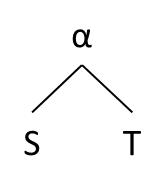Error, separative
In the common errors method, separative errors (Lat. errores separativi, Ger. Trennfehler) are errors that indicate that a witness is independent of another witness. Because such errors are used to reach conclusions about the stemma, separative errors have to be significant. Maas (1960, 26) offers an abstract description in which one witness (B) is determined independent of another (A) by an error in the latter, A, that the textual scholar feels confident cannot have been removed by conjecture in B, thereby demonstrating that B cannot derive from A because it does not repeat the error of A.
A more concrete example may illustrate the point. Two manuscripts, S and T, of a text share a significant number of conjunctive errors and are consequently postulated as deriving from the same hyparchetype. However, in the following sentence, the manuscripts report two different readings:
- S At ille obiit viridis.
- T At ille obiit viribus.
Here, T reports viribus where S correctly has viridis, a separative error that indicates S is not derived from T (provided that the reading in S does not represent an independent scribal conjecture).
In another reading, S records a variant that while grammatical is not contextually appropriate and T offers the preferred reading:
- S Sed officia boni civis, boni amici, boni filii secutus est.
- T Sed officia boni civis, boni amici, boni filii executus est.
In this case, in which S reports secutus where T has the contextually required executus, the separative error shows T cannot be derived from S (provided that the reading in T does not arise from interposed scribal conjecture).
Because the identification of separative errors indicates that neither of the witnesses derives from the other, the relationship in the following illustration can be posited.
Illustration

Fig. 1: The relationship of two manuscripts based on a separative error. The example is simplified and emended, based on the manuscripts of Seneca's Epistulae Morales ad Lucilium, 93, 4 (cf. Reynolds 1965).
References
– Maas, Paul. 1960. Textkritik. 4th ed. Leipzig: Teubner. – 1st ed. 1927.
– Reynolds, Leighton Durham, ed. 1965. L. Annaei Senecae ad Lucilium Epistulae Morales. 2 vols. Oxford: Oxford University Press.
In other languages
DE: Trennfehler
FR: erreur séparative
IT: errore separativo
MH, AC